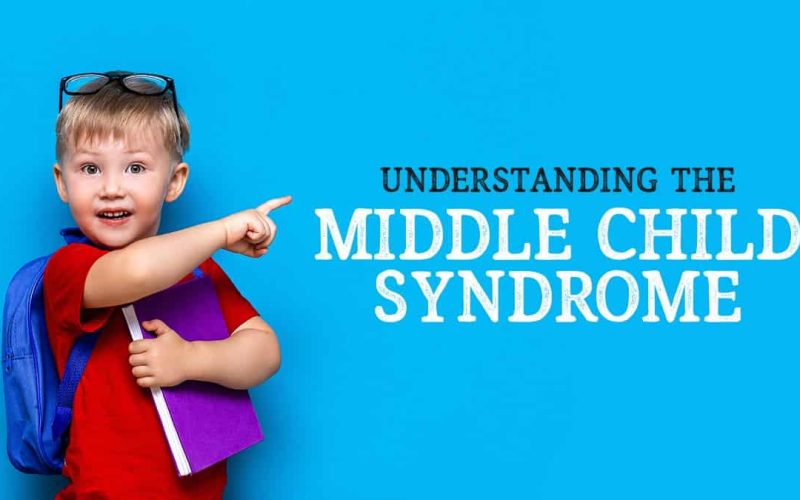You might be wondering if “middle child syndrome” is real if you are a middle child or have a middle child sibling.
Middle child syndrome is the assumption that because of their birth order, middle children are removed, overlooked, or even outright forgotten.
According to lore, as a result of being the middle child, some children may have some personality and relationship characteristics.
We will discuss in this article whether middle child syndrome is a true, popular feature of middle children and what science says about birth order and middle child syndrome.

Is It a Real Thing?
Alfred Adler developed a hypothesis in 1964 about the importance of birth order for personality growth. He argues in his theory that while children are born into the same family, their birth order significantly affects their psychological development.
According to Adler’s theory, a child can have multiple personality traits, depending on their birth order.
For instance:
- The oldest child is more authoritarian and feels all-powerful due to the high expectations often set by the parents.
- The youngest child is treated like a spoiled baby and can never rise above the other siblings.
- The middle child is even-tempered but has trouble fitting in because he or she is sandwiched between the younger and older siblings.
Alfred Adler developed a hypothesis in 1964 about the importance of birth order in the growth of personality. He argues in his theory that while children are born into the same family, their birth order significantly affects their psychological development.
According to Adler’s theory, a child can have multiple personality traits, depending on their birth order.
Characteristics of Middle Children

How does being a middle child affect one’s personality and relationships? Some common ideas about the characteristics of middle kids are given below.
Personality
Children in the middle have characters that their other siblings sometimes overshadow. The older sibling is strong-willed, and the baby is the younger sibling, leaving the middle child somewhere in between. Their nature, rendering them calm and even-tempered, can be dulled down by their siblings.
Relationships
Middle kids can have difficulty feeling equal to their siblings in parental interactions. The older sibling also has more responsibilities, and the younger sibling takes care of the parents. Not as much focus is paid to the middle child as to either of them.
Rivalry
The middle child also needs to contend for parental care for the younger and older siblings. They might compete with siblings for consideration, as they risk being overlooked by one or the other. They can also become peacemakers as they find themselves at the core of everything.
Favoritism
Middle children generally don’t know if they are the family’s favorite. Favoritism can exist for the eldest child, who is viewed as unique, or for the youngest child, who is viewed as an infant. The middle child slips somewhere in between and cannot be either parent’s favorite.
How Does It Affect Adults?
Some claim that middle-child syndrome may have a lasting effect on kids as they grow into adults. If the above characteristics are correct, being a middle child well into adulthood could cause a cascade of negative effects.
The personality and relationship traits that characterized them as children can grow into similar traits in adult relationships.
In adult relationships, for instance, middle kids who feel they have been ignored can struggle with co-dependence.
In adult life, maybe at work or at home, they might continue to be peacemakers. Compared to the personality of other adults around them, their personality may be dulled.
They might even have difficulty believing that they should be the “favorite” person of a best friend or partner. As adults, middle kids prefer to hang on to the same defiant and/or people-pleasing traits.
Take Holly Schrock, a 31-year-old mother of five at home in Newtown, Pennsylvania, who grew up as a middle child. “I wasn’t a bad kid, but I was definitely pushing the envelope a little,” says Schrock. In reality,
Schrock became involved in an argument with her parents at one point during the teen years that culminated in her running away for three days.
Even though Schrock admits she has settled down a little since then, she will still not take the guff from anyone. She says, “I don’t like being told what to do, period,”
If the middle child feels abandoned during adolescence, he/she may be dealing with problems of codependency or self-confidence.
They might also succeed in mediating disputes in their personal or professional lives.
What Does the Science Say?

The research underlying birth order is still being discussed despite these beliefs in middle child syndrome.
The effects of birth order on many disorders were examined by researchers, including OCD, schizophrenia, depression, autism, and even anorexia.
Most of this analysis covers all possible birth orders, including the consequence of becoming a middle child.
One of the most popular assumptions about middle-born children is that they have distant relationships with their parents.
One research in 2019 found that middle-born children were less likely to feel comfortable talking about sex education with their parents (compared to first-born or last-born children).
That said, the outcomes of this broad survey (of more than 15,000 individuals) were similar among women, with 30.9% of last-born women reporting that it was easy to speak about sex with parents at age 14 and 29.4% of middle-born women reporting the same.
Among men, 17.8 percent of middle-born men found it easy to talk about sex with their parents, while it was easy for 21.4 percent of last-born men.
Research in 1998 showed that middle-born kids are less likely to claim they are nearest to their mothers.
The study of studies noted that middle-borns are often less likely to claim they will turn to their parents when under duress.
The impact of birth order on 320 undergraduate students was examined by a more recent study from 2016.
The researchers discovered that middle-born children were likelier than their older siblings to be less family-oriented.
Maladaptive perfectionism, characterized by the intense need to make things go as expected, was also more likely to grow.
This study does not actually say the whole picture or even show that personality is defined by birth order.
In one literature review, the author found that some studies indicate that middle-aged children are 33 percent more likely than their older siblings to participate in delinquent activities.
However, the author concluded that his study showed that these results were non-significant, meaning they were simply due to chance rather than birth order.
On the relationship between birth order and depression, the authors of another study bring to light opposing findings.
They demonstrate that one study in 2003 showed that depression was more likely to occur in middle childhood.
Follow-up research in 2016, however, revealed that older kids were more likely to develop mental disorders such as depression.
The report went on to suggest that in puberty, “later-born” (not necessarily middle-born) kids were at increased risk of suicide attempts and psychiatric disorders.
It is important to remember that the word “middle children” can mean any children who are not the family’s oldest or youngest.
This can be distinct from a single middle child and may influence growth and personality.
“In addition, some studies on birth order in general, such as a 2015 study of more than 20,000 individuals in Great Britain, the United States, and Germany, found that birth order “does not have a lasting impact on large personality characteristics such as extraversion, emotional stability or compatibility.
Given this fact and the fact that several studies have shown conflicting results, it is difficult to tell whether middle child syndrome exists. It is much more likely that several factors decide the growth of anyone.
How to Handle Middle Child Syndrome Behavior?
Cliff Isaacson and Kris Radish in The Birth Order Effect (Schwartz Books) argue that the middle-born child needs to be accepted precisely for who he is to offset the attention you lavish on your overachiever firstborn and spotlight-hogging lastborn.
Here are several tips for middle child syndrome management;
Offer Reassurance
You need to stress that if your child makes a mistake, his punishment is not linked to his siblings, nor does it affect the fact that you do care for him.
Clarifying the purpose behind the punishment is particularly important when dealing with a middle-born child who is already feeling lost in the mix.
Don’t Leave Them Out
Give appropriate attention to your middle child so he doesn’t feel the need to act out.
Your middle child would be less likely to finger-paint Picassos all over the living room wall to get you to notice him by lavishing praise for his impressive easel paintings.
“If you’re having dinner, ask the middle child, ‘How was your day?’ Spend time alone with the middle child.
Set up a date on the calendar so he knows it’s coming.'” You are reassuring her by concentrating on the middle child, letting her know she is as important as her siblings, and stopping her from getting lost in the shuffle.
Make His Achievements a Big Deal
Chances are that after going through the whole firstborn circus of milestones when your second-born (or third-, or fourth-, or fifth-born) gets a gold star for his book essay, it’s not just as thrilling.
Reassure your child with sentences such as “you are part of the family,” Isaacson and Radish write, but also acknowledge his achievements as worth celebrating.
Encourage Differences
Is your eldest the district-wide spelling bee champ? Although following in her footsteps would be good for your middle-born boy, it is a breeding ground for future feelings of animosity and inferiority.
Instead, inspire your middle boy to find his own niche, whether academic, athletic, or creative.
Wallace says, ‘Middle kids can often become artistic because it will give [them] a unique position in the family, especially if the oldest one is good at school.’
Maintain Open Communication
In a perfect universe, we’d all be mind-readers. Your middle child will not say anything, even though he feels ignored.
Talk to him about the experience of [being] the middle child, “Talk to him about the experience of [being] the middle kid,” Say, ‘It’s hard because we have a kid to take care of, and your older brother is your older brother,’
No More Hand-me-downs
Ok, just less, maybe. “An occasional hand-me-down is fine, but your middle child may be particularly appreciative of something new, especially a key item, like a coat or jacket,” writes Dr. Kevin Leman in The Birth Order Book: Why You Are the Way You Are (Revell).
In the same way, special privileges can help your middle child feel special, such as choosing and watching a movie without interference from her siblings.
Capture the Memories
“Above all, make sure that your middle child’s family photo album has its share of photographs,” Leman writes. “Don’t let him or her fall victim to the stereotyped fate of having thousands of photos of the older brother or sister and just a handful of him or her.
And make sure you take some of your middle-born ones by yourself, not necessarily with your big brother or little sister.
The Bottom Line
Middle child syndrome is a common concept used to describe how being a middle child affects the character and perspective of one’s life.
Some assume that middle-aged children are often overlooked or neglected, adversely affecting adulthood.
Although some research indicates that personality from birth order may have some impact, the findings are conflicting, and further research is required.
Ultimately, personality and life outcomes, though not generally by birth order, are determined by several social, financial, and family factors.
References;
- Middle Child Syndrome: Everything You Need to Know: Parents
- Is Middle Child Syndrome a Real Thing?: Healthline







